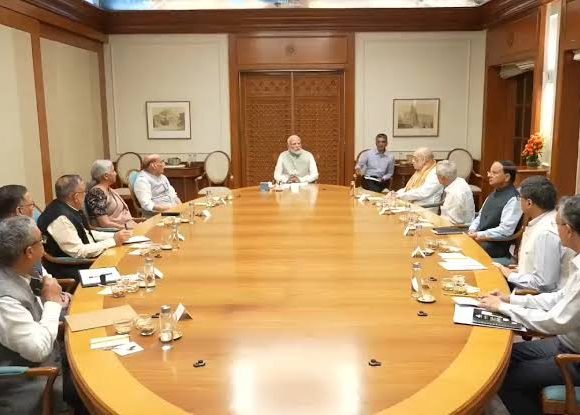
India Plans Indus Water Diversion Amid Treaty Suspension
India has suspended its adherence to the Indus Waters Treaty (IWT) and is preparing to divert water from the Indus River system to address national interests, a move expected to severely affect Pakistan’s water supply. This strategic shift follows the Pahalgam terror attack on April 22, which India attributes to Pakistan-based actors.
Indus Waters Treaty Suspended Over Terror Ties
The Indus Waters Treaty, signed in 1960 with the World Bank as a guarantor, divided the rivers between India and Pakistan — granting India control over the eastern rivers (Sutlej, Beas, and Ravi) and Pakistan the western rivers (Indus, Chenab, and Jhelum).
After the Pahalgam attack, External Affairs Minister S. Jaishankar confirmed that the treaty would be kept “in abeyance” until Pakistan demonstrably ceases support for cross-border terrorism. The government’s position is clear: national security takes precedence over outdated diplomatic arrangements.
Strategic Plans to Divert Indus Waters
India is accelerating efforts to utilize more water from the rivers under its control. This includes redirecting water from the Indus system into Indian territories, specifically states like Rajasthan, Haryana, Himachal Pradesh, and Delhi.
The Ministry of Jal Shakti has begun desilting and flushing operations on the Chenab River to maximize storage potential for winter. Additionally, infrastructure to divert water toward domestic use is being developed on a war-footing to limit the volume reaching Pakistan.
Domestic Utilization to Be Prioritized
Authorities have identified multiple regions within India suffering from water shortages. Redirecting Indus system waters to these regions is being framed as both a national security and humanitarian priority. The move also aligns with India’s larger policy shift toward water self-reliance, especially amid external hostilities.
Political Debate Intensifies in Kashmir
Jammu and Kashmir’s former Chief Minister Omar Abdullah urged the central government to revive the Tulbul Navigation Project in Sopore, a move possible only now that the treaty has been suspended. However, his remarks sparked political backlash. PDP leader Mehbooba Mufti accused him of “weaponizing water” and turning the Kashmir issue into a geopolitical flashpoint.
This debate reflects the broader struggle within Kashmir politics between aligning with national policy and preserving regional diplomatic sensitivities.
Pakistan Appeals as Water Crisis Looms
Islamabad has formally requested India to reconsider its decision, citing humanitarian concerns and treaty obligations. Pakistan’s economy, particularly agriculture, is heavily dependent on water from the Indus system, and any disruption could escalate internal instability.
India, however, remains unmoved. The World Bank, which played a limited role in the treaty, has acknowledged it cannot enforce compliance, especially when one party alleges breaches rooted in national security.
Immediate Measures Underway
As a short-term step, India has stopped releasing water from the Baglihar Dam and is also flushing reservoirs like Salal and Baglihar to increase retention capacity. These actions, though temporary, are intended to signal India’s seriousness and establish control over water as a strategic tool.
This evolving policy marks a historic turning point in India’s handling of the Indus Waters Treaty — turning what was once a diplomatic concession into a lever of strategic pressure.


















